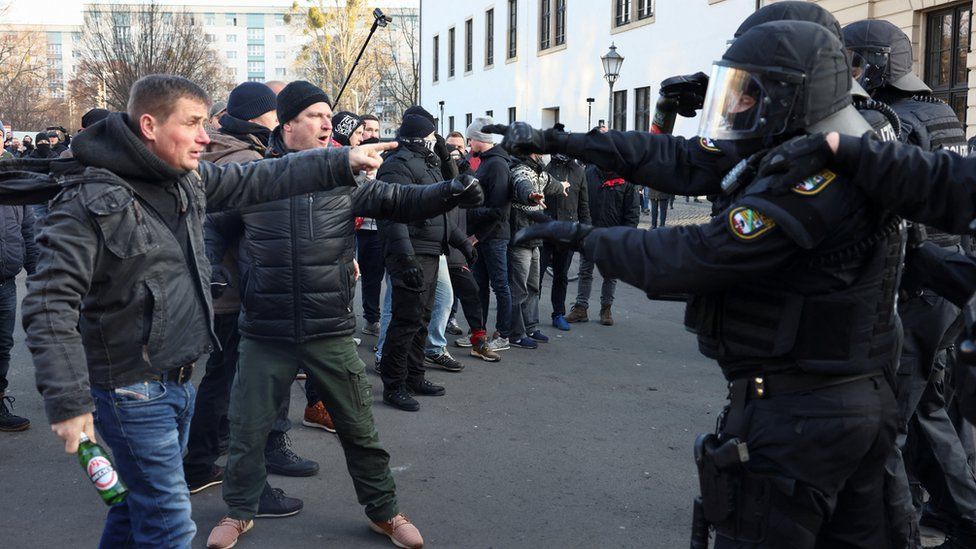Petra Köpping was at home when she realised that around 30 people wielding flaming torches had gathered outside her house.
The regional politician is responsible for public health in the eastern state of Saxony, and the shouting protesters on her doorstep were apparently furious about measures to tackle the coronavirus pandemic.
The protest last month, widely condemned by politicians and the public alike, was not a one-off. Every week tens of thousands of Germans take to the streets to demonstrate against restrictions and vaccination.
Turning to hatred
Many protests are peaceful, but others explode into violence and experts are increasingly worried by the aggressive language and threats aimed at politicians and public figures online.
Two security officers stood guard as I interviewed Petra Köpping about her experience.
Of course it’s disappointing. You try to make policies that protect people in a pandemic and that turns into anger and hatred

Some of the hatred towards her, she says, is stirred up and exploited by the far right.
“We have to make a clear distinction between organisers who engage in right-wing extremist ideology and want to change society – they don’t care about vaccination policy – and the people who come along because they’re opposed to vaccination.”
People like Björn who I met at a recent demonstration in Berlin. He’d brought along his young son and, as he held his hand in the crowd, Björn explained he wasn’t vaccinated himself because he thought the jab had been developed too quickly.
“The discrepancy between what we know and what the media tell us makes me suspicious.”

Covid has divided Germany. The unvaccinated are banned from restaurants, non-essential shops, leisure and arts facilities. And politicians are considering compulsory vaccination.
Björn was among several thousand people who marched through the brightly lit streets of the capital.
At the same time, in towns and cities across Germany, around 70,000 people took part in small, simultaneous demonstrations, some of which ended in scuffles and arrests.
Crying ‘Freedom’
Many take place on Monday nights. By advertising them as Spaziergänge, or strolls, organisers not only seek to bypass Covid laws, which might prevent a mass gathering, but also to invoke nostalgically the symbolism of the Monday night strolls that were used by pro-democracy protesters opposed to the communist regime of the old East Germany.
The crowd in Berlin shouted Freiheit – freedom – as loudspeakers blasted out antivax songs, misinformation and conspiracy: “You’d be surprised by what our politicians and public broadcasters keep secret from you – and why!”

Some German politicians have acknowledged that they’ll never persuade many of these people of the benefits and safety of the vaccine, let alone convince otherwise those who don’t believe Covid exists.
But authorities are worried by the spread of conspiracy theories and the threat of radicalisation. The number of recorded politically motivated crimes rose to its highest level in a decade last year.
“The big shift we’ve seen during the pandemic is that the more inherently violent ideas of overthrowing democracy which we’ve seen from the beginning turn more into concrete ideas,” said Miro Dittrich, who researches right-wing extremism at the Centre for Monitoring, Analysis and Strategy.

He spends his days undercover online, monitoring networks like the messaging app Telegram.
“So it’s not just ‘we’ll do a big demonstration in Berlin’, it’s ‘what are the private addresses of these people who we think are responsible for this and we have to visit their homes’.”
He pointed to an example from Telegram: a picture of the German health minister with text suggesting people storm his flat and “inject him with his own stuff”.
While he believes it would be wrong to assume that all those who express such ideas online represent a physical danger, “we’ve seen its crucial for people who actually do offline violence to feel that they have a community that agrees with them”.
Most Germans dismiss the conspiracy theories and the protesters who are, after all, very much in the minority. But the voice of discontent is loud. It’s disruptive and it’s persistent.
This video can not be played
To play this video you need to enable JavaScript in your browser.


























